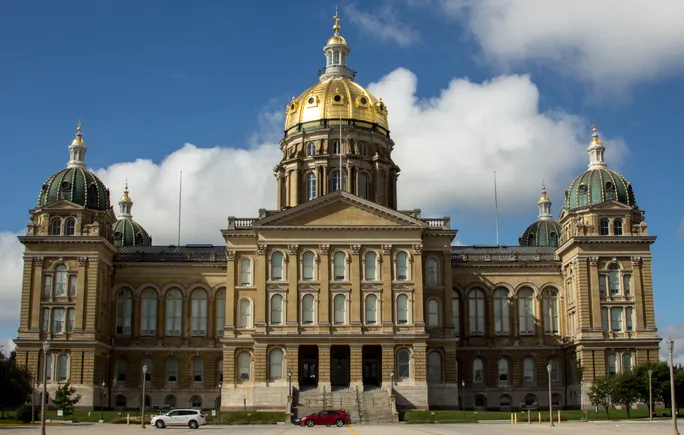Dive Brief:
- The Iowa House of Representatives will launch a committee dedicated to higher education legislation in January, signaling an increased focus on postsecondary issues from the Republican-controlled Legislature.
- House Speaker Pat Grassley announced the Higher Education Committee on Thursday, arguing the state’s colleges need to concentrate more on graduating students to fill high-need jobs. “A comprehensive review of Iowa’s entire higher education system is long overdue,” he said in a statement.
- Grassley tapped Rep. Taylor Collins to serve as committee chair when the new legislative session begins Jan. 13. Grassley praised Collins, who took office in 2023, for previous efforts “to dismantle the DEI bureaucracies at the regent institutions.”
Dive Insight:
Collins currently serves on the Iowa House’s Education Appropriations subcommittee and the state’s student aid commission. As a legislator, he has staunchly opposed diversity, equity and inclusion efforts.
He signaled those efforts would continue under the new committee.
“We have a tremendous amount of work to do in restoring Iowans’ confidence in our institutions, controlling costs, and returning the focus of our higher education system away from ideological agendas, and back to the pursuit of academic excellence,” Collins said Thursday.
Legislative opposition to DEI is not new in Iowa.
The state is a conservative stronghold. Republicans have controlled both chambers of the Legislature, as well as the governor’s mansion, since 2017. And in this month’s elections, the party gained a historic majority in the Legislature, further solidifying Republicans’ supermajority.
Since 2021, state law has prohibited Iowa public colleges from requiring trainings that teach that the U.S. or the state is systemically racist or sexist.
State lawmakers stepped up anti-DEI efforts this year.
In April, they passed a broad DEI ban as part of the state budget. Effective July, colleges must cut any DEI functions beyond those necessary for federal or accreditation standards.
Passage of the ban surprised at least one employee of the Iowa Board of Regents, which oversees the state’s universities. Rachel Boon, the board’s chief academic officer, said during a higher education panel in August that she would pitch state lawmakers on working with the board as an alternative to enacting legislation moving forward.
In November 2023, before the ban passed, the Board of Regents had already prohibited all campuswide diversity and inclusion work not required for legal or accreditation compliance. But the board’s policy didn’t define diversity, equity and inclusion.
The state law defines DEI as any “activities designed or implemented with reference to race, color, ethnicity, gender identity or sexual orientation.”
In May, Iowa Gov. Kim Reynolds signed a law banning public colleges from taking an official position on a wide array of issues, including allyship, cultural appropriation, systemic oppression, social justice, racial privilege or “any related formulation” of the listed topics.
Pen America, a free expression advocacy group, criticized the legislation as overly broad. “Given the vagueness implied by that last phrase, virtually any idea whatsoever could be considered forbidden for a university to express,” an October report from the group argued.
The organization cited the law as one of several passed in 2024 that it says endanger academic freedom.


